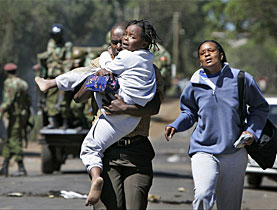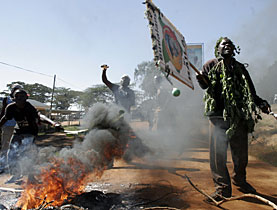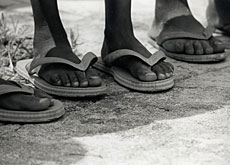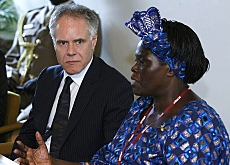Red Cross sends more aid to Kenya

The Swiss-run International Committee of the Red Cross (ICRC) has said it will send additional staff and relief supplies to Kenya, hit by post-electoral violence.
According to the United Nations, some 250,000 people have been displaced in the country, mostly in western regions, fleeing fighting sparked by the official result of last week’s presidential election.
About 15 staff are on their way to Kenya to assess the situation and determine what food, medicine and other essentials are needed to help those affected by the violence, said ICRC spokeswoman Anna Schaaf.
The Geneva-based organisation said on Friday it would seek to give the Kenyan Red Cross enough supplies to meet the basic needs of at least 100,000 people for several weeks.
“The ICRC’s main priority is to work with the Kenya Red Cross to assist families that have been displaced by the events or dare not leave their villages,” said Pierre Krähenbühl, the organisation’s director of operations, in a statement.
The majority of displaced people are staying in makeshift camps while others have sought refuge in police stations or churches, fleeing violence that has claimed 350 lives.
To enable hospitals, dispensaries and Red Cross emergency medical and first aid services to cope with an increased workload, the ICRC, which has asked donors to contribute an additional SF15million ($13.5 million) for its Kenya operations, is also distributing medical kits, drugs and other supplies to treat wounds.
The Swiss Agency for Development and Cooperation (SDC) said on Friday it would give SFr200,000 to the ICRC appeal. It has also sent a humanitarian expert to Kenya to evaluate the situation, but for the moment no independent SDC action is planned as needs are covered by the local Red Cross and NGOs.
The UN said that it was scrambling to get food to 100,000 terrified people facing starvation in western Kenya after they fled the violence, which included the burning to death of 30 people in a church.
Otherwise, Caritas Switzerland announced on Thursday that it plans to provide SFr50,000 to assist those displaced by the troubles. The Swiss branch coordinates its activities in southern Sudan and northern Kenya from Nairobi.
Rigged vote?
The deadly rioting was sparked by the re-election of President Mwai Kibaki last week in what opposition groups say was a rigged vote.
The Orange Democratic Party (ODM) charges that Kibaki stole the vote and says it has little faith in the judicial system to overturn the result. It claims that the courts are packed with the president’s allies and legal appeals could take years.
A spokesman for Kibaki said on Friday said that another election could be held if the constitution was respected.
There was some respite from the violence on Friday as a planned opposition rally fizzled out. However, police fired teargas in the port of Mombasa to disperse about 200 Muslim anti-government demonstrators after Friday prayers.
France has issued the strongest foreign criticism yet of the vote, backing opposition charges of fraud.
“Were the elections rigged or not? I think so, many think so, the Americans think so, the British think so, and they know the country well,” Foreign Minister Bernard Kouchner said.
The refusal of Kibaki and opposition leader Raila Odinga to talk to each other is at the heart of Kenya’s crisis. The clashes have pitted police and protesters against each other, but also members of Odinga’s Luo group and other tribes against Kibaki’s Kikuyus.
swissinfo with agencies
The Swiss foreign ministry has warned tourists against all but essential travel to Kenya. It has also warned nationals not to visit slum areas in Mombasa or Nairobi, or the towns of Eldoret, Kisuma or Kericho in western Kenya.
The Swiss colony in Kenya numbers about 900 and the embassy says it has regular contacts with the people on its register.
Around 1,000 Swiss tourists are thought to be currently holidaying in the country, mostly in the eastern coastal region. Most have decided to continue their holidays and after an initial wave of holiday cancellations to Kenya on Thursday, the number has fallen, according to holiday and airline companies.

In compliance with the JTI standards
More: SWI swissinfo.ch certified by the Journalism Trust Initiative



You can find an overview of ongoing debates with our journalists here . Please join us!
If you want to start a conversation about a topic raised in this article or want to report factual errors, email us at english@swissinfo.ch.